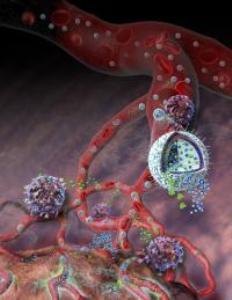Yale researchers have developed an anti-cancer drug delivery technique that addresses the challenges in combinatorial drug therapy.
 Illustration of a Nanolipogel (Credit:Nicolle Rager Fuller, NSF)
Illustration of a Nanolipogel (Credit:Nicolle Rager Fuller, NSF)
Cancers resist biological defenses in the body by confusing the immune system with secreted chemicals. Few cancer therapies endeavor to address both aspects by neutralizing the disease’s chemical secretions and enhancing the patient’s immune response. These attempts have almost always failed. The researchers’ unique drug delivery system shows promise of overcoming this hurdle.
The team employed established anti-cancer drugs but delivered them through a new material they engineered known as Nanolipogels (NLGs). NLGs are nanoscale, hollow spheres made of FDA-approved synthetic lipid that is biodegradable. The spheres are capable of carrying chemically diverse molecules. For the experiment, the team loaded the NLGs with two components. One was hydrophobic molecules of an inhibitor drug that acts against cancer’s transforming growth factor-b (TGF-b) and the second component was the water soluble protein, interleukin-2 (IL-2), to step-up the immune system response.
The researchers experimented on mice and found that the nanoscale spheres gathered in the blood vessels of tumors and introduced the drugs in a controlled manner by breaking drown gradually in the blood stream. The team chose to conduct their studies on primary melanoma and melanoma that has spread to the lung and found that their method of immunotherapy achieved promising results in an area where chemotherapy, radiation and surgery have proven unsuccessful. The NLGs are strong enough and flexible enough to carry different drugs and yet biodegradable in order to release the drugs. They are small enough to traverse through the bloodstream, yet big enough to be confined within the leaky cancerous vasculature.
The system is expected to be successful for immunotherapy of other type of cancers as well.